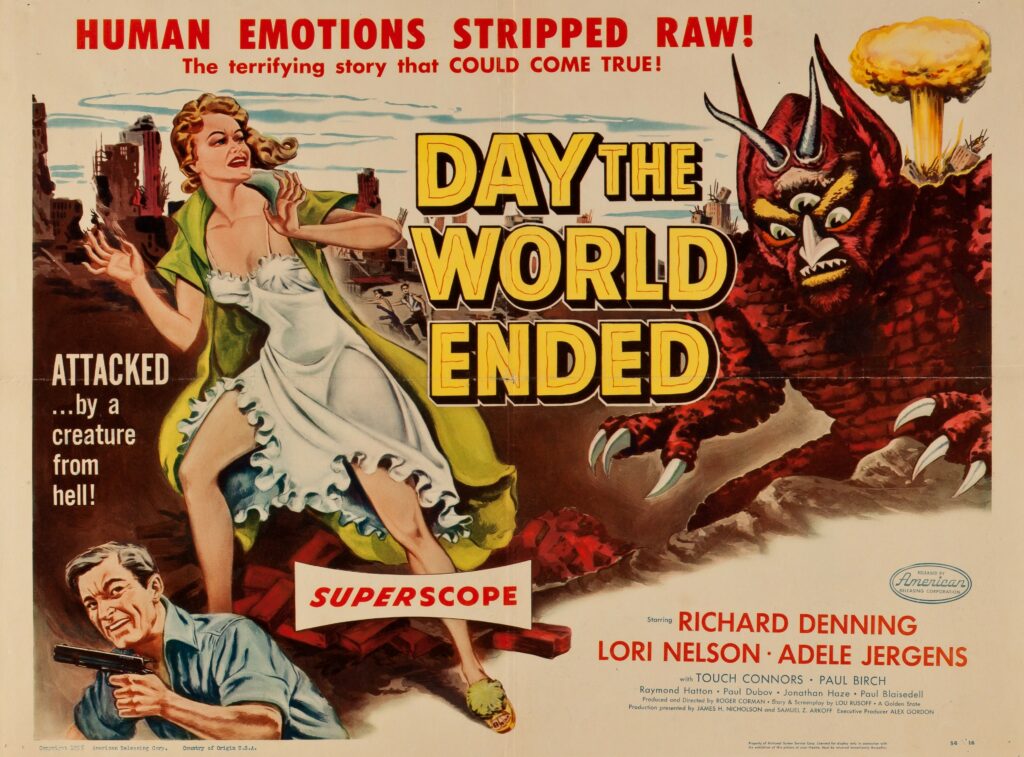
One of the “great” science fiction films I recall seeing as a kid is World Without End, a post-apocalyptic adventure in which a band of astronauts lands on a primitive planet that turns out to be Earth in the future.
That’s not a spoiler.
Other films might present similar surprises as twist endings, but World Without End delivers the revelation early and builds from there. That’s to the film’s credit, though whether it’s enough to make WWE a truly “great” film is debatable.
Regardless, when I was 10, World Without End made quite an impression. It had everything: space travel, time travel, intrepid astronauts, giant spiders, one-eyed mutants—the works! I watched it repeatedly when it aired on New York’s Million Dollar Movie (where featured films played twice a day for a week). I thought it was amazing.
And I’m not alone.

Director Joe Dante, who caught the film in a New Jersey theatre during its initial release, shares this memory on the Trailers from Hell website:
I love ‘World Without End!’ I stayed to see it twice on a Sunday afternoon double bill with ‘Abbott & Costello Meet The Mummy,’ and when I got home my parents had called the police. If I could go back and relive one afternoon at the movies, it’d probably be that one.
Of course, Joe had the advantage of seeing it in CinemaScope and Technicolor, whereas I had to be content with pan-and-scan in low-res black-and-white. Still, I loved it.
Alas, memories fade.
Years passed. I forgot about the film, so much so that when I first heard that Warner Archives was preparing a remastered Blu-Ray that would present World Without End in its original aspect ratio and restored Technicolor, I mistakenly confused the title with Roger Corman’s The Day the World Ended. Indeed, it was only after reading Glen Erikson’s CineSavant review at Trailers From Hell that I realized my mistake and quickly preordered the WWE disk.

Alas, when the Blu-Ray arrived, I didn’t make it through the movie’s first half hour.
It wasn’t that the movie was bad, but it certainly wasn’t great, and even the beautiful restoration with its eye-popping colors and 2:35 vistas weren’t enough to keep me watching.
If anything, the improved resolution only made the post-apocalyptic landscape look all the more like Bronson Canyon with the Hollywood Hills in the background.

And therein lies the challenge of compiling a list of Great but Forgotten Films.
What makes a half-remembered film great probably has less to do with the film itself than with who and where we were when we encountered it.
A statement alternately attributed to science-fiction fan Peter Graham, editor Terry Carr, film critic Baird Searles, and the fiction writers Avram Davidson, Barry N. Malzberg, and L. Sprague de Camp has it that “The golden age of science fiction is 12.” If that’s true, it might explain why many of the sf films we once considered great have become forgotten.
But there are exceptions, right?

To help jog my memory, I asked readers and friends to recommend titles of forgotten greats. The following (in alphabetical order) are among the recommendations I received:
- The Amazing Colossal Man (1957)
- The Angry Red Planet (1959)
- Equilibrium (2002)
- Event Horizon (1997)
- First Men in the Moon (1964)
- Gattaca (1997)
- Journey to the Farside of the Sun (1969)
- The Puppet Masters (1994)
- Moon Zero Two (1969)
- Outland (1981)
- Soylent Green (1973)
- Starman (1984)
- The Stepford Wives (1975)
- Tremors (1990)
Some of these are personal favorites that I haven’t seen in ages. Others are ones I’ve only heard about. I’m not sure any of them are truly great, but I’m looking forward to watching (or rewatching) some of them in advance of next week’s NASFiC panel on “Great but Forgotten Films,” especially since one of the panelists has proposed conducting the discussion in the form of a game show, with the panelists as contestants and the audience as judges. How exactly such a format will work remains to be seen, but if you’re attending the convention, I hope you’ll stop by and join in.
Either way, I’ll endeavor to post a recap here later this month.
Next up: the best stand-alone novels.

On a recent installment of the podcast The Movies That Made Me, screenwriter John Brancato laments how every movie today seems to be part of a series. “Everything is just eating itself,” he said, “to the point that nothing original can get made.”
The same can be said about novels, which brings us to a topic that I’ll be helping explore at this year’s Confluence Science Fiction Convention. Titled “Not Everything Is a Series: The Best Stand-Alone Novels of the Last Decade.”
Naturally, the focus will be on science fiction novels, or–more broadly–novels that fall under the banner of speculative fiction. And therein lies the challenge, since it seems that most sf books are part of a series. Moreover, the boundaries between genre and non-genre are becoming increasingly less defined. That’s not surprising in an age that some have called the Anthropocene–the epoch in which technology is redefining what is and isn’t possible.
Nevertheless, I’m ready to give the topic a go.
In the meantime, do you have any recent stand-alone sf books to recommend? If so, let me know by leaving a comment on this page or by reaching out via the social media buttons below. I’ll endeavor to share some of the titles receive in my next post … and during the Confluence panel discussion later this month.
Until then, keep watching the skies!

Leave a Reply